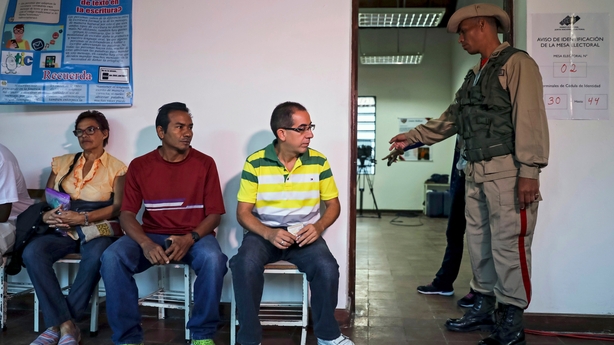Deadly protests rocked Venezuela today as voters broadly boycotted an election for a constitutional super-body that unpopular leftist President Nicolas Maduro vowed would begin a "new era of combat" in the crisis-stricken nation.
Opposition parties are sitting out what they call a rigged election aimed at consolidating Mr Maduro's power, leaving streets deserted and polling stations largely empty and dealing a blow to the legitimacy of the vote.
Anti-Maduro activists wearing hoods or masks erected barricades on roads and scuffles broke out with security forces who moved in quickly to disperse the demonstrators.
We need your consent to load this rte-player contentWe use rte-player to manage extra content that can set cookies on your device and collect data about your activity. Please review their details and accept them to load the content.Manage Preferences
Authorities said seven people were killed in the unrest and the opposition said the true death toll was around a dozen people, which would make today one of the deadliest days since massive and sustained protests kicked off in early April.
Mr Maduro, widely disliked for overseeing an economic collapse during four years in office, has pressed ahead with the vote to create the all-powerful assembly despite the threat of further US sanctions and months of opposition protests in which more than 115 people have been killed.
Critics say the assembly will allow Mr Maduro to dissolve the opposition-run Congress, delay future elections and rewrite electoral rules to prevent the socialists from being voted out of power in the once-prosperous OPEC nation.
The US Ambassador to the United Nations, Nikki Haley, offered Washington's first official response to the ballot in a tweet this evening.
Maduro’s sham election is another step toward dictatorship. We won't accept an illegit govt. The Venezuelan ppl & democracy will prevail.
— Nikki Haley (@nikkihaley) July 30, 2017
The opposition has vowed to redouble its resistance and US President Donald Trump has promised broader economic sanctions against Venezuela after the vote, suggesting the oil-rich nation's crisis is set to escalate.
"Even if they win today, this won't last long," said opposition supporter Berta Hernandez, a 60-year-old doctor, in a wealthy Caracas district. "I'll continue on the streets because, not long from now, this will come to an end."
Undeterred, Mr Maduro, a former bus driver and union leader narrowly elected in 2013, has accused right-wing governments of trying to sabotage "21st century socialism".
"A new era of combat will begin. We're going all out with this constituent assembly," said Mr Maduro, as he voted at 6am in a low-income area of the capital Caracas that has turned on the government.

With polls showing some 70% of Venezuelans oppose the constituent assembly, Mr Maduro's administration is hoping to avoid low turnout that would further undermine his legitimacy.
Venezuela's 2.8 million state employees are under huge pressure to vote - with some two dozen sources telling Reuters they were threatened with dismissal otherwise.
At state oil company Petroleos de Venezuela SA (PDVSA), workers received text messages asking them to send in their national identification number once they had voted, two sources said. They expressed fear the plan was to identify who had sat out the election.
The electoral council has ordered journalists stay at least 500 metres (1,600 feet) from voting centres, a move the opposition says is designed to hide paltry turnout.
Fueling anger against Mr Maduro is an unprecedented financial meltdown in the country of 32 million people, which was once a magnet for European migrants thanks to a booming economy that was the envy of Latin America.
But after nearly two decades of Socialist Party rule, currency and price controls have asphyxiated businesses.
Millions of Venezuelans now struggle to eat three times a day due to product shortages and runaway inflation that has put products like rice or flour out of reach.

